Genre: Simulation Developer: Bullfrog Productions Publisher: Electronic Arts Players: 1 Released: 1992
Ahh.. To be a god! To gather true believers around thyself and have thy land of milk and honey bloom – and to smite thyne enemies cruly and without mercy! Yes, It’s hard to deny that there lies a certain attractiveness in omnipotence, what with reshaping the lands at will and wreaking havoc upon unbelievers by natural disasters. Let fire rain down upon the heathens – that’s some way to spend Saturday night! In the Populous series of games, you are such an all-mighty god, watching over your folk, and growing in power as the number of your followers increases. Too bad that there are other omnipotent beings – deities do not take competition lightly…
The first game, Populous, was created for Amiga And Atari ST computers and pretty much established an entirely new genre: The god game. The game became a runaway hit, and as such it inspired a string of similar games created by other companies, none of which being able to reach the class of the original. This changed when the sequel, Populous II – Trials of the Olympian Gods, came along. The game was simultaneously released on Amiga, Atari ST and IBM PC and was later ported to the Genesis as well. Aside from a change in name and a slight drop in visual quality, the port went excellently and stayed virtually the same. (Interestingly the different regional distributions received different subtitles: The US release is called Wrath of the Gods while the European version, strangely enough, is named Two Tribes instead).
If you’ve played the predecessor you’re already familiar with the gameplay: On an isometric map of the world your followers are wandering around. At first you can only raise or lower the ground in the immediate vicinity of your tribe. If the area is flat enough, your people settle down and procreate. The wider the area, the bigger the settlements. As the number of your followers increases, so does your “manna” meter, which enables you to perform godly powers that’ll help you destroy your enemy. Populous II doesn’t deviate from the basic formula of the original. However, it improves the premise in almost every single regard.
Populous II is inspired by the Greek Pantheon. You are one of the many immortal children of Zeus and aspire to claim your place on Mount Olympus. To do so, however, you have to compete against your siblings. Once you’ve advanced far enough, you’ll even face mighty Zeus himself. All in all there are a thousand maps to clear and thirty-two different opponents, all with slight differences in strategy and cunning. You don’t have to clear every single map to advance in the game though, only defeat your opponents; but it makes for great versatility and replay value, since you rarely play the same map twice in a new game. Cleared stages are saved via password with up to 16 characters, which is a tad long but bearable. Besides, it does not only save progression but also your individual character stats as well.
Contrary to the first Populous you now are able to individualize your deity to a certain degree. While you can name your god and give it an individual appearance, the most important new feature are the experience points. Godly miracles now fall into one out of six different elements. Within these elements you can use your experience gained in defeating an opponent to unlock new powers (Five within each category except fire, which only has four but also possesses the most powerful and destructive of all: The Volcano). This introduces a new layer to the gameplay, since a different focus on certain elements changes your tactics as well: Only when concentrating on water, for example, you can create baptismal founts which convert followers of your opponent to your side. Also, whereas in the original you could convert one of you followers into a single type of knight to directly take on and slay your enemies, you now have six different “champions” (one for each element) with different qualities. For example, the “vegetation” champion splits into two for each enemy slain, while the “water” champion leads male enemies like a siren into a watery grave.
Speaking of male: The sprites of the followers are now either of the male or of the female persuasion. This is part of the graphical overhaul of the game, which now looks better in every regard when compared to its predecessor (though I preferred the bright marble-like surroundings of the first game to the simple black backdrop employed here). The Icons representing your godly powers are more organized and its handling has been improved, even though there are now way more powers (or “divine intervention effects” as the game calls them) available – thirty to be exact (five per element except fire plus the “raise/lower land” power available from the start). On the top right you can now see a coliseum representing the number of your followers (in blue) and those of your opponent (in red) on the map so you can make out whether you’re currently ahead or behind in power.
There are two flaws which this game sadly inherited from its precursor. The most noticeable one is that the game suffers from slowdown once there’s a lot going on onscreen, though fortunately it’s not as bad as in the first game. In such moments the cursor moves jerkily which makes controlling the game in hectic situations pretty hard. Also, while you have the option to change to a full-screen view of the game, I’d strongly advice against doing so, since it’ll make the slowdown issues almost unbearable. Secondly, there isn’t any background music. Slow phases of the game may seem a little boring without any acoustic diversion. On the other hand, the sound effects have improved, and without background music you’ll immediately hear the distinct sound of something happening, for example when the opponent hits you with one of his miracles or a fight is breaking out. The AI hasn’t much improved either, but is still strong enough to make the game challenging from the intermediate stages onwards.
These flaws prevent Populous II from being a perfect. Still, it is a very well rounded and compelling strategy game, one of the best of its category within the Genesis library and a captivating title even today. Thirty-two opponents take a while to defeat, and the replay value is pretty high thanks to a multitude of different maps and the individual distribution of experience. This sequel is an improvement on every single facet of an already perfect formula. Thus, verily, it is truly a godly game.
SCORE: 9 out of 10


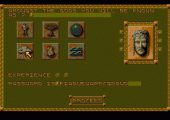
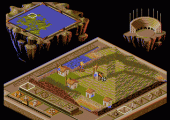
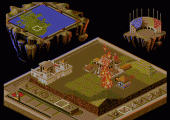
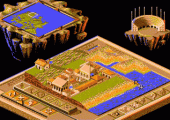
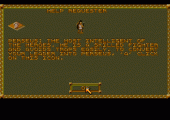
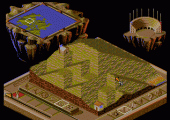
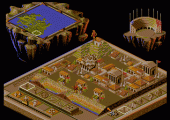
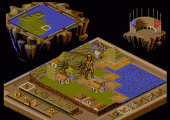
Just a note that this was a European exclusive (though a proto of the US version has been found). I think it’s not mentioned in the review since people were holding out hope that a US version might have been released, but AFAIK it never was.
Also the game is locked out on NTSC hardware, and I’m not sure if a Game Genie code exists (I checked the usual spots and didn’t turn anything up).
good review thanx